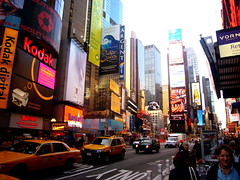| New York City (Photo credit: kaysha) |
In the long run, the devastation the storm inflicted on New York City and other parts of the Northeast will barely nick the U.S. economy. That's the view of economists who say a slightly slower economy in coming weeks will likely be matched by reconstruction and repairs that will contribute to growth over time.
The short-term blow to the economy, though, could subtract about 0.6 percentage point from U.S. economic growth in the October-December quarter, IHS says. Retailers, airlines and home construction firms will likely lose some business.
The storm cut power to about 7 million homes, shut down 70 percent of East Coast oil refineries and inflicted worse-than-expected damage in the New York metro area. That area produces about 10 percent of U.S. economic output.
New York City was all but closed off by car, train and air. The superstorm overflowed the city's waterfront, flooded the financial district and subway tunnels and cut power to hundreds of thousands. Power is expected to be fully restored in Manhattan and Brooklyn within four days.
Most homeowners who suffered losses from flooding won't be able to benefit from their insurance policies. Standard homeowner policies don't cover flood damage, and few homeowners have flood insurance.
But Freddie Mac said it will offer help to borrowers whose homes were damaged or destroyed, who live in designated disaster areas and whose loans the mortgage giant owns or guarantees. Among other options, mortgage servicers will be allowed to reduce the monthly payments of affected homeowners or require no payments from them temporarily.
Across U.S. industries, disruptions will slow the economy temporarily. Some restaurants and stores will draw fewer customers. Factories may shut down or hold shorter shifts because of a short-term drop in customer demand. ... Continue to read.

No comments:
Post a Comment